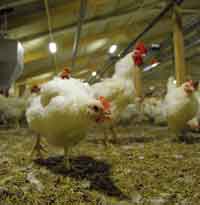High welfare chicken imports pose a threat

Imported poultrymeat may be higher welfare as a cheaper alternative to home-grown chicken, the RSPCA has said.
RSPCA scientist Dr Marc Cooper made the observation after visiting Thailand’s second largest exporter of chicken breast meat to the UK, finding birds are raised in lower stocking densities and are slower growing.
“I don’t think our industry should be complacent about our welfare standards or feel that we can sit still. Imports do pose a real threat to us and not just because they are cheaper but in welfare terms they can be better,” Dr Cooper told Poultry World.
“The bulk of chicken in the UK, what we would refer to as standard chicken, isn’t always raised to the highest welfare standards.”
Dr Cooper said people generally had an image of production overseas as being low welfare and lacking modern technology but he found very advanced units in Thailand.
“There is none of this backyard-type farming going on with this producer. In terms of the structure and set-up of the house it’s almost identical to the standard industry practice over here.”
“For the particular company I visited, the lowest standard they would be operating to would be Assured Chicken Production because all of their farms over there are ACP-approved.”
Birds in facilities visited by the RSPCA in Thailand were kept at a stocking density of 14 per square metre, were allowed six hours of rest at night and were of a slower growing variety.
A statement from the British Poultry Council said the lower stocking density Dr Cooper describes was due to the hot climate and breeds used in Thailand and the UK for standard production are the same.
“Due to environmental differences it is very hard to compare British and Thai chicken,” the statement said.
“The breeds used in Thailand are the same as the breeds which we use here in the UK, the birds are grown for longer due to weather conditions and are given slightly more space due to the risk of heat stress.”
“Nearly half of all the meals eaten in this country use chicken, and this shows that consumers are comfortable buying British chicken knowing that it is a safe, affordable meat grown to high welfare standards.'”
As well as modern sheds and ventilation systems Dr Cooper said some facilities in Thailand demonstrated extreme biosecurity procedures.
“On the largest farm to get access on to the farm you need to go through a swimming pool which has head high barriers you need to duck under, so you need to be immersed three times,” he said.
“The stock keepers which work on that farm will go on farm when the birds arrive as chicks and they are not allowed to go off that farm until the birds go to slaughter.
“But that was not typical; most farms have the same biosecurity procedures we have over here.”
